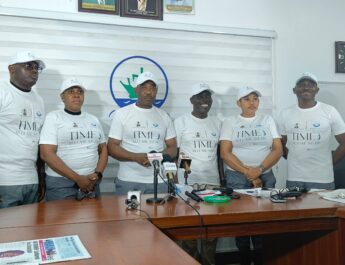As the global maritime industry marked the “Day of Seafarers 2024”, the Nigerian Maritime Administration and Safety Agency (NIMASA), rolled out the drums last month to celebrate Nigerian Seafarers in a special way
The Nigerian Maritime Administration and Safety Agency (NIMASA), brought smiles on the lips of the Nigerian Seafarers on Tuesday, June 25, 2024. The event was the celebration of the “Day of Seafarers 2024” which took place at the Eko Hotels and Suites, Victoria Island, Lagos.
It was a day NIMASA under the supervision of the Federal Ministry of Marine and Blue Economy and the International Maritime Organization (IMO) joined the rest of the world to celebrate their nation’s Seafarers. The theme of this year’s event was, “Navigating the Future: Safety First”. The event witnessed an array of dignitaries in the shipping industry and maritime-related businesses in the country.
A roll call of dignitaries that graced the well attended celebration included the Minister of Marine and Blue Economy, Adegboyega Oyetola who was represented by a Director in the ministry, Babatunde Obata, a former Minister of Interior, Captain Emmanuel Iheanacho, Chairman, House Committee on Marine and Maritime Safety Education, Hon. Kadiya Buka Abba, Dr. Dayo Mobereola the Director General of NIMASA and Comrade Adewale Adeyanju the president of the Maritime Workers Union of Nigeria (MWUN).
Other dignitaries present at the auspicious occasion were the president of Nigerian Shipowners Association (NISA), Otunba Shola Adewumi, president Shipowners Association of Nigeria (SOAN), Mr Sonny Eja, the Chief Executive Officer (CEO)/ Executive Secretary of the Nigerian Shippers Council, Barr. Pius Akuta and the Managing Director of Nigerian Ports Authority, Mohammed Bello Koko who was represented by Engr Olalekan Badmus among numerous others.
The Minister of Marine and Blue Economy, Oyetola said he was deeply honoured to be part of the 2024 Seafarers Day celebration, noting that “Seafarers are the lifeblood of the maritime industry who go through various challenges to make sure that goods and services get to every part of the world. It is our duty to ensure their wellbeing and safety”.
In his keynote address, Captain Iheanacho said, “Without Seafarers ships cannot drive themselves. We need Seafarers to drive international trade. It is important to celebrate Seafarers, government regulations forbid a lot of them to leave the ships; these are some of their challenges. We should make provision for them as much as we can”. Captain Iheanacho said at one point he had to spend 36 months onboard vessel without coming out.
Delivering his welcome address for this year’s Seafarers Day, Mobereola, the NIMASA boss said Seafarers are the backbone of global trade who brave challenging conditions to ensure that over 89 percent of world trade reaches their destination. Mobereola added that NIMASA capacity building initiative is helping Seafarers to acquire the required skills needed in the modern world.
Mobereola: “It gives me great pleasure to welcome our distinguished guests and invitees to this special event, the celebration of Day of the seafarers. Today is not just a celebration; it’s a profound recognition and appreciation for the people who truly move the world.
“As the International Maritime Organization (IMO) reminds us with the theme “NAVIGATING THE FUTURE: SAFETY FIRST,” seafarers are the backbone of global trade. They brave challenging conditions, ensuring over 80% of the world’s trade reaches its destination. Their dedication strengthens not only the international economy, but more importantly, the well-being of their home nation, Nigeria.
“However, we recognize the humongous challenges seafarers face, including war zones, pirates, and exposure to health risks. We also acknowledge that some basic rights, such as proper insurance and compensation, are not always guaranteed. This is a call to action for all stakeholders government, ship-owners, and ourselves at NIMASA – to address these issues and prioritize seafarer welfare.
“I wish to state that the Agency’s human capacity building initiatives have resulted in the training and retraining of Nigerian Seafarers to acquire the required skills in line with industry needs. We have prioritized the training programmes/courses to enable the seafarers acquire the relevant advanced certificates that will enhance their employment opportunities.
“In the area of employment of Seafarers, the Agency through the introduction of the New Cabotage Compliance Strategy on Manning has ensured that all foreign Seafarer Ratings and some category of officers onboard Cabotage Vessels are immediately replaced with qualified Nigerian Seafarers.
“The Third phase of the Nigerian Seafarers’ Development program aims to graduate 435 officers. Many trainees are currently undergoing mandatory sea-time training on-board ocean going vessels. The challenge lies in securing placements for these qualified seafarers, but we are working to resolve this issue.
“The Agency is exploring avenues to create jobs for our seafarers, including collaborating with government agencies like the Nigerian Content Development and Monitoring Board (NCDMB) and the Nigeria Immigration Service (NIS).
“Soon, certain positions such as Ratings and Officer of the Watch will be designated as “no longer available” for foreign Seafarers to occupy. However, some other positions may be considered based on merit for foreigners to occupy.
“Let me inform this esteemed gathering, that the Agency is working tirelessly to strengthen its legal framework by domesticating all Maritime Labour related ILO Conventions ratified by Nigeria. These conventions include the Maritime Labour Conventions (MLC) 2006 as amended, the Seafarers Identity Document (SID) Convention as amended, and the Dock Work Convention.
“Nigeria has the potential to be a maritime powerhouse. To achieve this, we must focus on a three-pronged approach:
“Talent Acquisition: We need to bridge the gap in understanding of the maritime industry, attracting young minds with fulfilling career paths.
“Talent Development: Equipping seafarers with continuous learning opportunities and a service-oriented mindset will unlock their full potential.
“Talent Deployment: We must promote female participation and ensure qualified Nigerians secure placements on vessels”.



